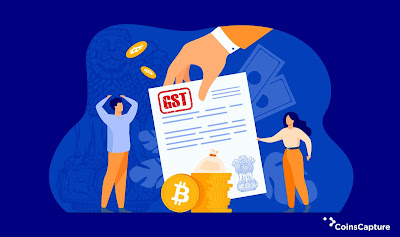All You Need To Know About Bitcoin & GST In India
Cryptocurrency has been under the shadow of uncertainty due to the unpredictability of legality and application of cryptocurrency in India. The RBI - Reserve Bank of India had prohibited dealing with cryptocurrency in 2018 that led to lifting the ban in March 2020. However, this year the country is yet again anticipated about placing the ban of private cryptocurrencies such as Bitcoin in India and providing with a framework in the budget session of the parliament with reference to the creation of an official digital currency that will be issued by the RBI.
It has also led to several exchanges proposing a unified way to work together with the government inorder to create a healthy ecosystem in the world of cryptocurrency.
India has been working on the framework of regulations and application of cryptocurrency and blockchain in the country. This also involves tax, wherein the government has been weighing on proposing to impose 18% GST - goods and services tax on the transactions of Bitcoin. It is also stated to be an estimation of approximately Rs. 40,000 crore annually.
The CEIB - Central Economic Intelligence Bureau has also initiated a proposal to the CBIC - Central Board of Indirect Taxes and Customs that suggests the government to receive potentially on bitcoin trading an approximate of Rs. 7,200 crores annually. Thus, CEIB has been conducting a study on the levy of GST on cryptocurrency.
As per the sources of the finance ministry, CEIB has implied that bitcoin can be categorized under the class of ‘intangible assets’ and could be levied on GST for all its transactions, wherein the board suggested cryptocurrency to be treated as current assets.
Also Read, The Legalization Of Cryptocurrency In India - Things You Need To Know
Abhishek Jain, tax partner, EY said, “A regulatory framework needs to be in place for cryptocurrency before taxation is considered. Once that is in place, the question would be about its treatment for tax purposes. Currency is not subject to GST and the total value of cryptocurrency should not therefore be covered by the tax. Only the currency exchange fee, or brokerage, should be subjected to GST."
The CBIC has contemplated over the proposal before placing it before GST council.
Following stated are the key points of the proposal:
Cryptocurrency mining will be treated as a supply of service since it generates cryptocurrency which also involved transaction fees and rewards. Hence, the tax will be obtained from the miner on transaction fees or reward. If the value of the reward exceeds Rs. 20 lakh then the individual miners will need to register under GST.
The proposal also considers the wallets storing keys to be treated taxable, thus, the wallet service providers are then to be registered under GST.
Cryptocurrency trading may draw 18% GST.
Cryptocurrency exchanges will require to register and pay tax too.
Cryptocurrency buying and selling to be considered under the category of supply of goods while the other related facilitating transactions would be treated under services that include transfer, soupy, storage and accounting.
Also Read, Everything You Need To Know About Crypto Market In India
The value of cryptocurrency will be determined on the transaction value in rupees or any equivalent freely convertible foreign currency.
When both the buyer and seller are in India, the transaction would be reviewed as a supply of software and wherein the place of supply will be the buyer’s location.
In the working of transfer and sake, the place of supply will be the location of the registered person. However, in a case wherein the sale has to be made to a non-registered person then the place of supply would be the location of the supplier.
Integrated GST will be applicable for transactions conducted beyond the Indian territory and would be treated as import or export of goods, hence, IGST will be levied on cross-border supplies.
However, Nischal Shetty, the CEO of WazirX stated that 18% GST on cryptocurrency transaction amount would not be feasible also no other country has such tax, “It would mean investors need to get 18% appreciation to justify their purchase.”
As per the FEMA - Foreign Exchange Management Act, 1999 in India, it defines currency to involve currency notes, postal notes, postal orders, money orders, drafts, cheques, travellers cheques, letters of credit, bills of exchange and promissory notes, credit cards or such similia instruments as notified by the Reserve Bank of India.

Comments
Post a Comment